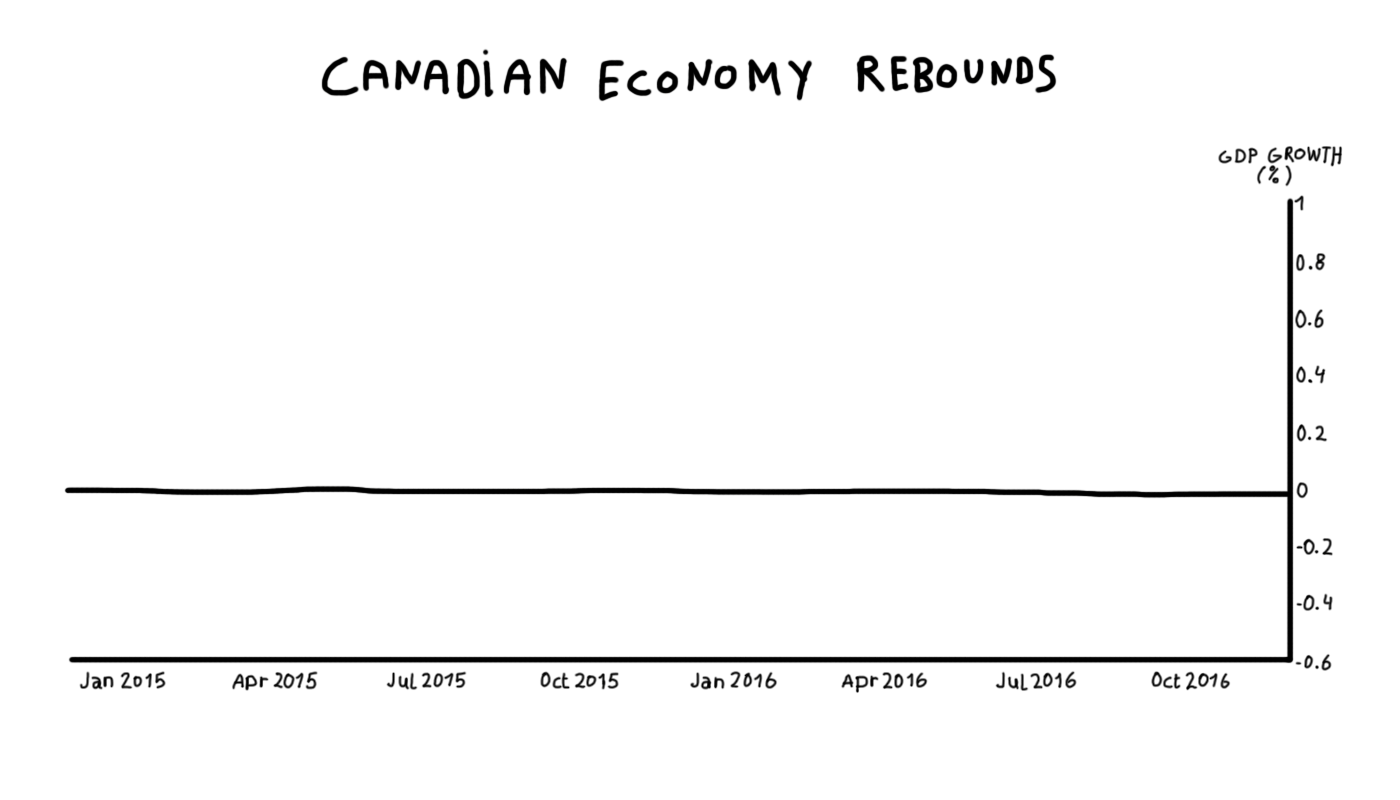Canada's Economy And The Overvalued Canadian Dollar

Table of Contents
Causes of an Overvalued Canadian Dollar
Several factors contribute to an overvalued Canadian dollar. Understanding these drivers is key to predicting future trends and mitigating associated risks.
Commodity Prices and Export Strength
Canada's economy is heavily reliant on commodity exports, particularly oil and natural gas. Strong global demand for these resources pushes up their prices, increasing the inflow of foreign currency into Canada. This increased demand for the CAD strengthens its value.
- Impact of global demand for commodities: Fluctuations in global energy prices directly impact the CAD's exchange rate. High global demand translates to a stronger CAD.
- Influence of trade agreements (e.g., USMCA): Trade agreements like the United States-Mexico-Canada Agreement (USMCA) facilitate trade and can positively influence commodity exports, further strengthening the CAD.
- Impact of the energy sector on the CAD: The energy sector's performance is a significant determinant of the CAD's value. A booming energy sector typically leads to a stronger currency.
Interest Rate Differentials
The Bank of Canada's monetary policy significantly impacts the CAD's value. Higher interest rates in Canada compared to other countries attract foreign investment, increasing demand for the CAD and pushing up its value.
- Impact of monetary policy: The Bank of Canada's decisions on interest rates are a major factor influencing the CAD's exchange rate. Raising interest rates typically strengthens the currency.
- Comparison of Canadian interest rates with other major economies: The difference between Canadian interest rates and those in other major economies (e.g., the US, Eurozone) influences capital flows and therefore the CAD's value.
- Effects of inflation on interest rate decisions: Inflationary pressures often prompt the Bank of Canada to raise interest rates, which in turn strengthens the CAD.
Safe Haven Status
Canada's reputation for political stability and economic soundness attracts foreign investment, particularly during times of global uncertainty. Investors often view the CAD as a safe haven currency, driving up demand and its value.
- Comparison with other safe haven currencies: The CAD competes with other safe haven currencies like the US dollar and Swiss franc. Global events often determine the relative attractiveness of these currencies.
- Impact of global events on the CAD’s value: Geopolitical instability or global economic downturns often lead to increased demand for the CAD, boosting its value.
- Investor sentiment and its effect: Positive investor sentiment towards the Canadian economy strengthens the CAD, while negative sentiment weakens it.
Economic Impacts of an Overvalued Canadian Dollar
An overvalued Canadian dollar has far-reaching consequences, impacting various sectors of the economy differently.
Challenges for Canadian Exporters
An overvalued CAD makes Canadian exports more expensive in foreign markets, reducing their competitiveness and potentially harming export-oriented businesses.
- Examples of industries affected (e.g., manufacturing, agriculture): Industries heavily reliant on exports, such as manufacturing and agriculture, are particularly vulnerable to an overvalued CAD.
- Strategies for mitigating the impact of an overvalued dollar: Businesses can employ strategies such as hedging, diversifying export markets, or reducing production costs to offset the negative effects of a strong CAD.
Benefits for Canadian Consumers
Conversely, an overvalued CAD benefits consumers by making imported goods cheaper.
- Lower prices of imported goods: Consumers benefit from lower prices on imported goods, increasing their purchasing power.
- Increased consumer purchasing power: A stronger CAD enhances consumer spending capacity, stimulating domestic demand.
- Access to a wider variety of goods: Consumers gain access to a broader range of imported goods at more competitive prices.
Impact on Inflation
The effect of an overvalued CAD on inflation is complex. Cheaper imports can suppress inflation, but reduced export competitiveness can lead to higher prices for certain domestically produced goods due to decreased supply.
- Impact on the consumer price index (CPI): The CPI reflects the impact of the CAD on the overall price level in the economy.
- Interplay between exchange rate and inflation: The relationship between the CAD and inflation is not always straightforward and requires careful consideration.
- Considerations for the Bank of Canada: The Bank of Canada must consider the impact of the CAD on inflation when setting monetary policy.
Predicting and Managing the Overvalued Canadian Dollar
Predicting and managing the risks associated with an overvalued Canadian dollar requires careful analysis and proactive strategies.
Economic Forecasting and Analysis
Economic indicators and forecasting models are essential for predicting future movements in the CAD.
- Key economic indicators to watch (e.g., GDP growth, inflation rates, unemployment rates): Monitoring key economic indicators helps to anticipate changes in the CAD's value.
- Limitations of economic forecasting: Economic forecasting is inherently uncertain, and predictions should be treated with caution.
Strategies for Businesses
Businesses can employ various strategies to mitigate the risks associated with an overvalued CAD.
- Hedging strategies using derivatives: Businesses can use financial instruments like derivatives to hedge against currency fluctuations.
- Exploring new markets: Diversifying export markets can reduce reliance on markets sensitive to CAD fluctuations.
- Cost reduction strategies: Improving efficiency and reducing production costs can improve competitiveness even with an overvalued currency.
Government Policy and Intervention
The Canadian government's role in influencing the exchange rate is limited. Direct intervention is rare, focusing more on broader macroeconomic policies.
- Limitations of government intervention: Government intervention in currency markets can be ineffective and potentially disruptive.
- Potential policy responses to an overvalued currency: The government might focus on policies that promote export competitiveness or encourage foreign investment in other sectors.
Conclusion
The relationship between Canada's economy and the value of the Canadian dollar is multifaceted and dynamic. An overvalued Canadian dollar presents both advantages and disadvantages, impacting different sectors in varied ways. Understanding the factors driving the CAD's value, including commodity prices, interest rates, and Canada's safe haven status, is crucial for businesses and individuals alike. Mitigating the risks associated with an overvalued Canadian dollar requires proactive strategies, including economic forecasting, hedging, and diversification. Staying informed about economic indicators and seeking professional financial advice is essential for navigating the complexities of this important economic relationship. Further research into Canadian economic policy and currency trading strategies can provide more in-depth understanding and empower better decision-making in the face of an overvalued Canadian dollar.

Featured Posts
-
 Analisis Del Partido Liga De Quito Iguala Con Flamengo En La Copa Libertadores
May 08, 2025
Analisis Del Partido Liga De Quito Iguala Con Flamengo En La Copa Libertadores
May 08, 2025 -
 Psg Nantes Mac 1 1 Berabere Bitti
May 08, 2025
Psg Nantes Mac 1 1 Berabere Bitti
May 08, 2025 -
 Xrp Price Surge Outperforming Bitcoin Post Sec Grayscale Etf Filing Announcement
May 08, 2025
Xrp Price Surge Outperforming Bitcoin Post Sec Grayscale Etf Filing Announcement
May 08, 2025 -
 Kripto Para Yatirimi Kripto Lider Hakkinda Bilmeniz Gerekenler
May 08, 2025
Kripto Para Yatirimi Kripto Lider Hakkinda Bilmeniz Gerekenler
May 08, 2025 -
 Xrp Price Analysis Examining The Path To 3 40
May 08, 2025
Xrp Price Analysis Examining The Path To 3 40
May 08, 2025
